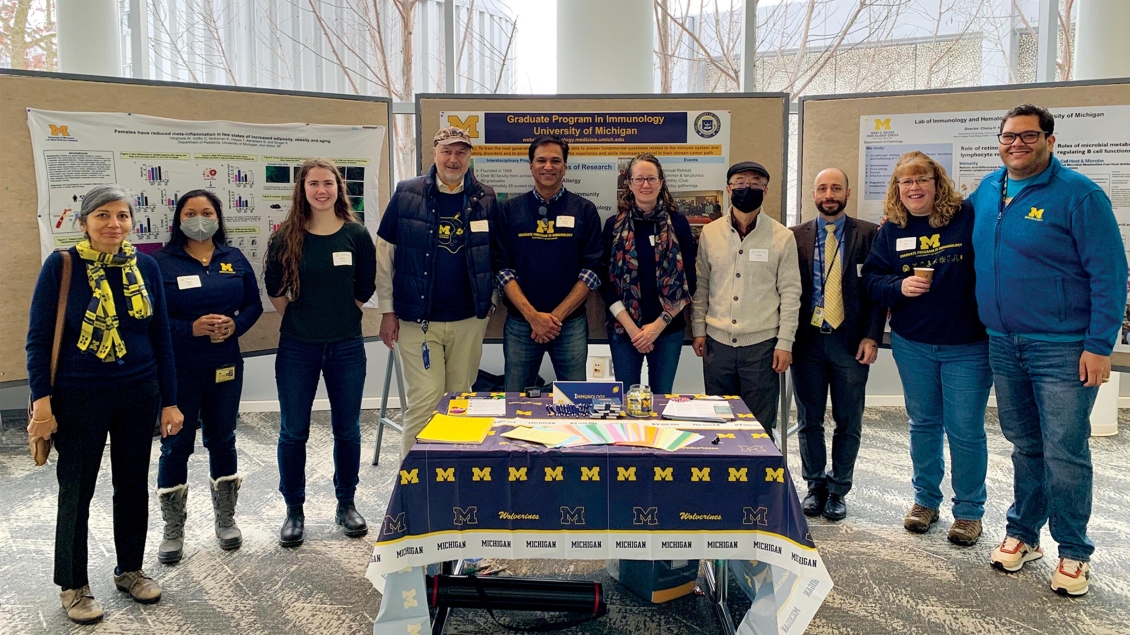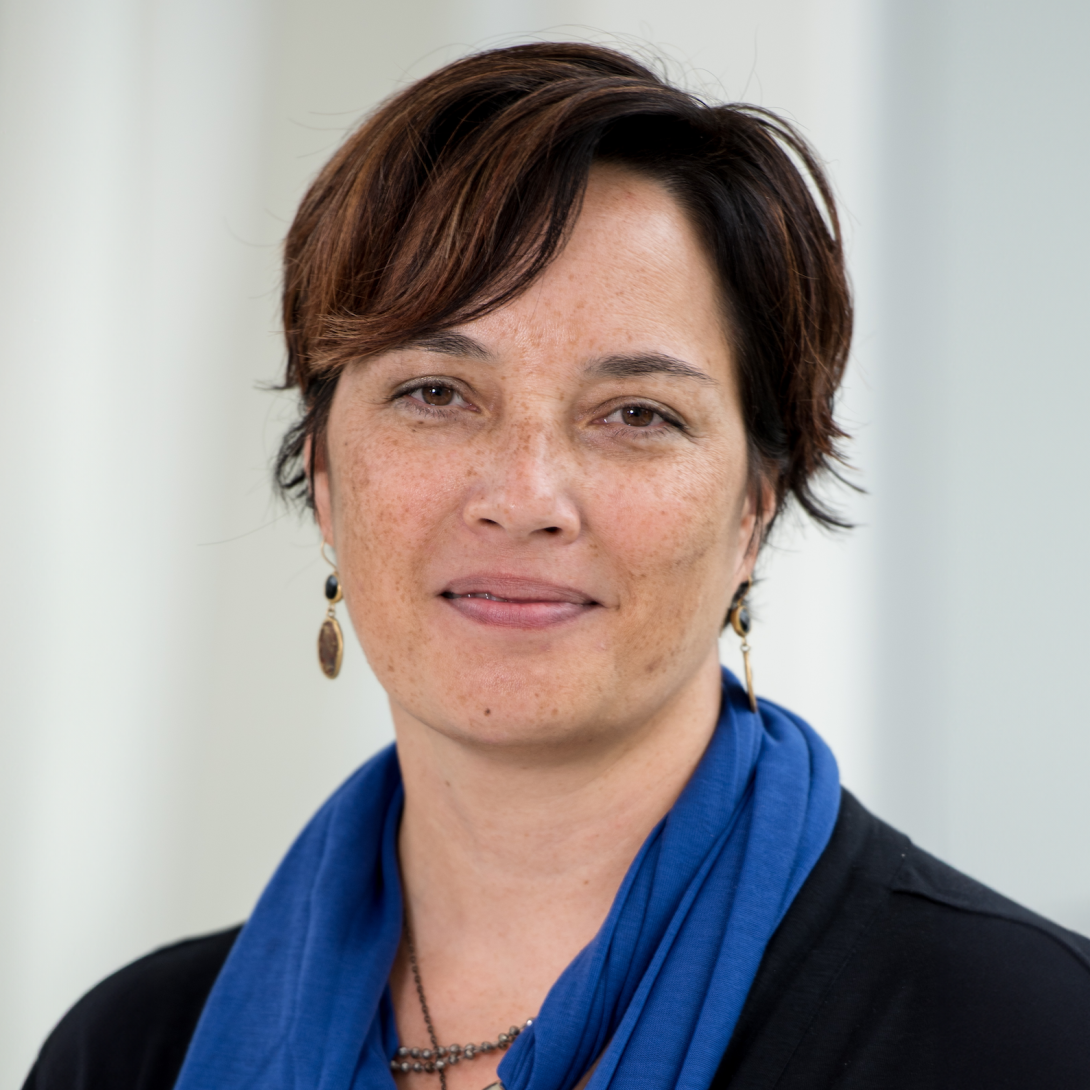
Creative and innovative research is the hallmark of our graduate program in the University of Michigan Medical School Department of Microbiology and Immunology. This challenging program is designed to provide a nurturing environment in which graduate students can fully develop and express their intellectual talents, research skills, and teaching abilities.
These goals are accomplished through an integrated program of independent research, graduate courses, seminars and teaching. Entering students select from a wide range of stimulating courses designed to complete their preparation for advanced study and research. Molecular and cellular immunology, microbial pathogenesis, molecular virology, microbial physiology, cellular and molecular networks, biochemistry and molecular genetics are some of the topics covered in our courses.
To facilitate development of skills necessary for a career in modern research and teaching, many courses are oriented towards discussion of the primary research literature.
Students can enter the PhD program in the Fall terms only.
The Program in Biological Sciences Department (PIBS), coordinates first-year graduate studies for 14 biomedical Ph.D. programs at the University of Michigan Medical School, including the Doctoral Program in Microbiology & Immunology. All admissions are handled through PIBS.
Please visit the PIBS webpage for an online application. All application materials should be sent to the PIBS Office.
Students accepted into the Microbiology and Immunology PhD program are provided with a stipend, full tuition, and healthcare. The department typically accepts between 5–8 students a year. The department is located on the U-M Medical Campus, adjacent to the University Hospitals and Cancer, Cardiovascular and Geriatric Centers.
- NIH training grant in Cellular Biotechnology
- NIH training grant in Cancer Biology
- NIH training grant in Human Genetics
- NIH training grant Molecular Mechanisms of Microbial Pathogenesis
- Dr. F. G. Novy fellowship
- Dr. Frances W. Chin endowed fellowship
- Rackham Merit fellowship
- Regents' fellowship
- University fellowships
- Research assistantships
Applicants to the doctoral program are automatically considered for financial aid. In addition, applicants are encouraged to seek competitive national sources of fellowships. Because funding opportunities are more limited for foreign students, foreign applicants are urged to investigate fellowships provided by their governments or other local sponsors. All students admitted to the PhD program are supported by one of the above internal or external sources. Funding is guaranteed for all PhD candidates in good standing until completion of the thesis defense.
Department specific questions can be directed to:
Natalie Deeb, MPH
Graduate Student Program Manager
[email protected]
Each year, the Ward J. MacNeal Educational and Scientific Memorial Trust Distinguished Dissertation Award is given to a Microbiology and Immunology PhD graduate trainee for overall excellence.
Our graduated students defended innovative and rigorous dissertations. See who they are, what they did and where there are now.
During the first year as a member of Program in Biomedical Sciences (PIBS), students participate in brief research projects by rotating in up to four laboratories with approximately two-month rotations during the PIBS year. Laboratories for the rotation period are selected by the student in consultation with faculty members. Such research experiences provide exposure and training in the diverse research interests of our faculty and have proven valuable to students in their selection of a thesis research advisor after the first year. Beginning in the second year, students have the opportunity to develop their teaching abilities by contributing to instructional Medical School courses offered by our department.
As a vital part of graduate training, students refine communicative skills by presenting discussions of research literature in a weekly seminar course, Microbiology 812. Additionally, numerous journal clubs are organized by students and faculty around special topics, including molecular pathogenesis, virology, and immunology. Graduate students also meet regularly to discuss their research activities amongst themselves in an informal, relaxed setting. These activities are complemented by frequent departmental colloquia presented by recognized scientists from leading research institutions around the nation. Students are encouraged to participate in OMIS (Organization of Microbiology and Immunology Students), which sponsors events such as the annual department picnic, as well as holding regular meetings to discuss student issues within the department.
Meet current doctoral students in the University of Michigan Medical School Department of Microbiology and Immunology PhD program.
Students complete a two-step evaluation within two years of matriculation. The first checkpoint is an oral examination that occurs after the first year of classes to test mastery of coursework and analytical thinking. The students are examined on their broad and specific knowledge of three assigned papers. In addition, students will use one of the three papers as a platform to propose future experiments in outline form, which will be discussed during the exam.
The second checkpoint occurs in the second year of study and requires the student to write a six-page proposal of future work on the topic of their thesis research. During the student's first committee meeting, the committee will evaluate the student's knowledge of the literature and methodology relevant to this thesis proposal. PhD candidacy is achieved by successfully completing the formal course work and the two checkpoints.
The research experiences of students are expected to lead to productive scholarship in the form of peer-reviewed journal publications and conference presentations. Degree candidates will meet annually with their faculty committee to ensure satisfactory progress towards completion of the thesis project; first author publication of a primary research article is required for graduation. Students will receive constructive evaluations from the committee members after each committee meeting.
The PhD degree is granted upon completion of a scholarly body of work, submission of a written thesis and presentation of an oral defense based on the student's original, independent research. This program is designed to require approximately five years for completion, and graduates of our department have gone on to pursue outstanding postdoctoral positions and scientific careers.

Professor of Microbiology and Immunology
PhD Program Director & Graduate Studies Chair
Microbiology & Immunology